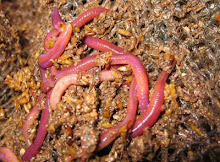
When I met with C., the director of Hogwarts' Center for Public Service, a few weeks prior to our worm bin installation, she provided me with a copy of the instructions that the Center places on its worm bin, offering guidelines on what/what not to put into the bin. The following dire caveat caught my eye:
1. Do NOT add the following:
• Papaya seeds: makes us sterile!
While I would've never thought to have placed papaya seeds in the bin anyway, since they're hard objects that'd be slow to biodegrade, naturally, I wondered whether the warning was true or apocryphal. So I Googled "papaya seeds worm sterility" and discovered the probable source. Mindy Jaffe, the owner of Waikiki Worm and the most well-known of Hawaii's worm suppliers and vermicompost educators, warns against feeding worms papaya seeds as "they will render them temporarily sterile". Hmm. I decided to pursue my research and attempt to dredge up some reliable scientific sources that definitively linked papaya seeds to worm sterility. If this was true, I wanted to know what the underlying cause was…it sure seemed questionable. After all, papaya seeds are definitely edible—would consuming papaya seed dressing, for example, render humans sterile, temporary or otherwise?
After doing an Internet search, I discovered the following:
1. Apparently, in some cultures, e.g. Indian Ayurvedic medicine, papaya (not just the seeds, but the fruit itself) is traditionally used in indigenous and naturopathic medicine as a vermifuge: a means for expelling intestinal worms (no mention of earthworms here, nor of the supposed sterilizing effects). Also, papaya apparently has anti-nematodal properties as well.
2. The following rationales were provided as to why papaya could be an effective vermifuge:
-Papain, the active enzyme in papaya, eats away at the protective outer cuticle of worms. I can't speak for intestinal worms, but given the number of people who've successfully fed papaya shells to their composters, who've subsequently thrived, the theory sounds questionable. Apparently, the effect is lessened in the presence of digestive juices, which might account for why the worms don't seem to be suffering ill effects.
-Papaya seeds contain a chemical, benzyl isothiocyanate, that is an anthelminthic, that is, a medicine of use against intestinal worms. As the papaya matures, the level of this chemical decreases in the fruit's flesh, but increases in the seeds. Alas, like papain, it's also apparently unstable in the presence of digestive juices, so it couldn't be particularly effective as such.


No comments:
Post a Comment